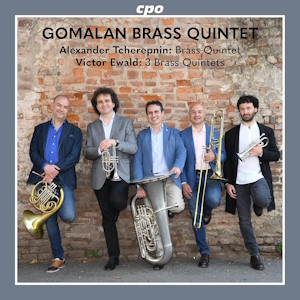
Victor Ewald (1860-1935)
Brass Quintet No 1 in B-flat minor, Op 5
Brass Quintet No 2 in E-flat major, Op 6
Brass Quintet No 3 in D-flat major, Op 7
Alexander Tcherepnin (1899-1977)
Brass Quintet, Op 105
Gomalan Brass Quintet
rec. 2022, Romanesque Church of San Giorgio di Valpolicella, Italy
cpo 555 680-2 [63]
This is a surprising and captivating disc that has introduced me to a composer I had never heard of before: Victor Ewald, whose music is an absolute delight – so it was a great shame to learn that fewer than twenty of his works survive. He was another of those amateur musicians who pursued careers that seemed a million miles away from music – in this case, that of civil engineer and professor at the Faculty of Construction Materials in St. Petersburg, his native city. He made a significant contribution to a substantial encyclopaedia on Industry and Technology, being responsible for the first volume entitled “History and Contemporary Technology of Architecture”. However, unlike the members of the so-called “Mighty Five”, Ewald did not devote himself sufficiently to composition, although he did take to heart his teacher Karl Davydov’s advice that he should involve himself in music as much as possible, which resulted in his being for sixteen years a cellist in the orchestra of timber merchant Mitrofan Belyayev. It would be interesting to hear his String Quartet which, it turns out, is a transcription of the Brass Quintet no.1, made when the original work was considered too technically demanding. For the brass version, we have to thank American musicologist André Smith, who received the manuscripts for the quintets from Ewald’s son-in-law sixty years ago. Following a further nine years to authenticate them, they received their première during the 1974-75 season, played by the American Brass Quintet.
The music in all three of his brass quintets is jaunty and upbeat, demonstrating the composer’s keen sense of what the individual instruments are capable of. A particular standout for me is the second movement of the first quintet, its singing line marvellously lyrical – not that every movement isn’t equally satisfying. Ewald shows a brilliant facility for fusing these five instruments into a wonderfully cohesive whole, having them sing out as one voice; his compositions must surely win over any doubters over brass music and I certainly do not remember enjoying such music more. The quintets have apparently been recorded several times before, though I very much doubt that the Gomalan’s reading can be bettered.
Alexander Nicolayevich Tcherepnin (1899-1977) differed from Ewald in that from a very young age he was determined to carve out a career in music and as a result is recognised as one of the most significant Russian composers of the 20th century. I remember discovering him through an old Turnabout vinyl disc of piano music on which some of his pieces were included and being struck by their refreshing originality. His compositions are highly distinctive and I have since been delighted to make the acquaintance of his six piano concertos and four symphonies. His father was already an established composer in his own right; when the 1917 revolution of 1917 occurred he took his family abroad, first to Georgia then to Paris. Alexander ended up in China before finally settling in the USA and becoming an American citizen. Although he was only eighteen when the family left Russia, he already had over 200 piano pieces packed into his luggage, including his Bagatelles, op.5 which was what first drew me to his music on the vinyl record. Although some of his music takes on a whiff of China, its roots remain Russian and his experiments with dissonance find their expression in several compositions, including this brass quintet, though there is nothing here to ‘frighten the horses’ since the music is also laced with charm and he never allowed experimentation to override musical communication. Composed in 1970, the quintet also has its quirky humorous moments and is more enjoyable with each additional hearing.
These works could hardly enjoy better advocacy than that here by the Italian Gomalan Quintet, which plays each note with obvious glee making the disc a thoroughly engaging experience – and the sound is ultra crisp.
Steve Arloff
Buying this recording via a link below generates revenue for MWI, which helps the site remain free



















